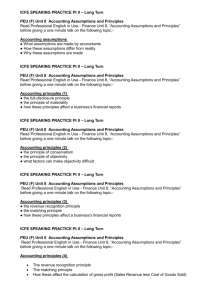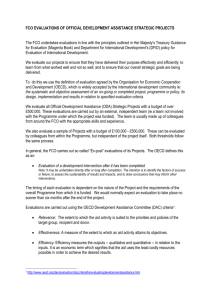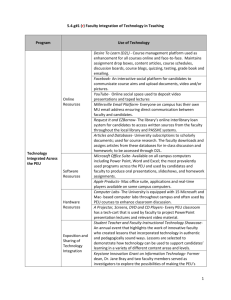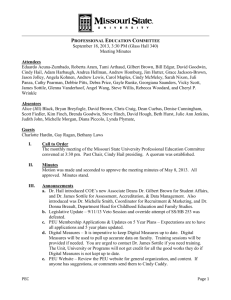2008 PEU Strategic Plan
advertisement
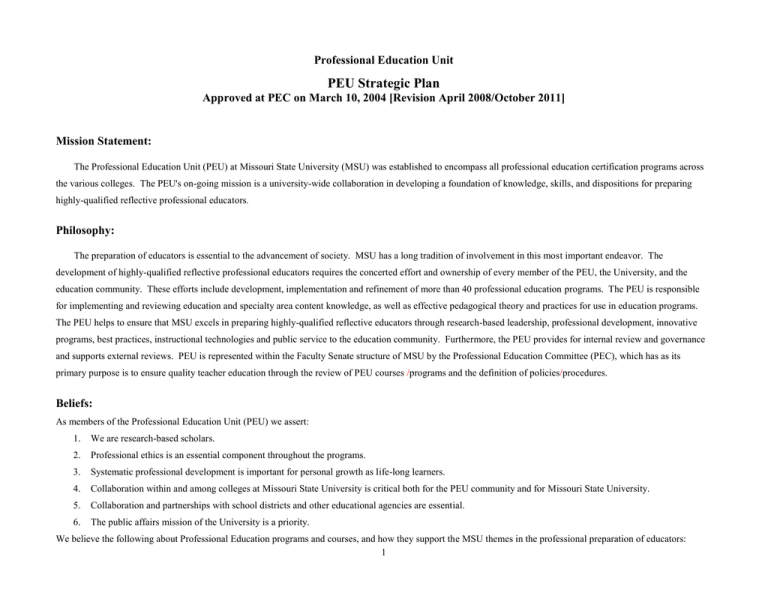
Professional Education Unit PEU Strategic Plan Approved at PEC on March 10, 2004 [Revision April 2008/October 2011] Mission Statement: The Professional Education Unit (PEU) at Missouri State University (MSU) was established to encompass all professional education certification programs across the various colleges. The PEU's on-going mission is a university-wide collaboration in developing a foundation of knowledge, skills, and dispositions for preparing highly-qualified reflective professional educators. Philosophy: The preparation of educators is essential to the advancement of society. MSU has a long tradition of involvement in this most important endeavor. The development of highly-qualified reflective professional educators requires the concerted effort and ownership of every member of the PEU, the University, and the education community. These efforts include development, implementation and refinement of more than 40 professional education programs. The PEU is responsible for implementing and reviewing education and specialty area content knowledge, as well as effective pedagogical theory and practices for use in education programs. The PEU helps to ensure that MSU excels in preparing highly-qualified reflective educators through research-based leadership, professional development, innovative programs, best practices, instructional technologies and public service to the education community. Furthermore, the PEU provides for internal review and governance and supports external reviews. PEU is represented within the Faculty Senate structure of MSU by the Professional Education Committee (PEC), which has as its primary purpose is to ensure quality teacher education through the review of PEU courses /programs and the definition of policies/procedures. Beliefs: As members of the Professional Education Unit (PEU) we assert: 1. We are research-based scholars. 2. Professional ethics is an essential component throughout the programs. 3. Systematic professional development is important for personal growth as life-long learners. 4. Collaboration within and among colleges at Missouri State University is critical both for the PEU community and for Missouri State University. 5. Collaboration and partnerships with school districts and other educational agencies are essential. 6. The public affairs mission of the University is a priority. We believe the following about Professional Education programs and courses, and how they support the MSU themes in the professional preparation of educators: 1 1. Professional education is a University-wide collaborative effort. 2. We are developing highly-qualified reflective educators. 3. A foundation of knowledge, skills, and dispositions is needed to support the growth of students. 4. Learning with understanding, a process requiring active involvement and time for processing, is essential in all programs. 5. Integration of philosophy, research, and best practices strengthens education courses and programs. 6. Integration and infusion of diversity standards and inclusive excellence are needed across all education programs. 7. Integration of technology into the classroom and curriculum supports effective teaching and learning. 8. Uniformity of quality is essential in all education programs, including alternative programs for certification and licensure. 9. Regular and collaborative review of professional education programs and courses, along with policies and procedures, is both internally and externally important. This review helps maintain the integrity and quality of professional education programs at MSU, and it ensures that these programs meet state, national, and professional society’s guidelines for preparing qualified school personnel. 10. Consistent assessment and review is necessary to make informed program changes. 11. Student appeals concerning exceptions or waivers to any Teacher Education Program policy or requirement is essential to maintain the integrity and quality of education programs. We believe the following with regard to Professional Education governance: 1. Education programs must be developed and governed by faculty. 2. It is vital that all education programs undergo external as well as internal reviews. PEC serves as the University-level external review of departmental program and courses. State and national professional organizations provide external accreditation review. 3. Oversight and review by PEC and its committees facilitates communication between departments and the PEU. 4. All PEU members have ownership in programs of the Unit and therefore create a community voice supporting these programs. 5. Implementing and maintaining quality education programs requires budgetary support for personnel and resources. 6. Effective leadership of the Unit by both faculty and administrators is essential. We believe the following with regard to the Professional Education Unit's relationship to the community-at-large and the Missouri State University public affairs mission: 1. We are committed to serve the community-at-large – sharing our expertise and experience in support of life-long learning. 2. We prepare highly-qualified reflective educators to serve the community-at-large. 3. The development of our candidates relies on the working partnerships with community organizations and school systems through qualified field experiences and clinical practica. 4. Our graduates extend the mission of the University through their professional activities. 2 Six Themes: 1. Personnel Processes: Support and Development To facilitate the recruitment and retention of outstanding faculty, administrators, and staff by empowering them to be exemplary teachers, conduct high quality research and participate in service activities through strong support and professional development programs. Goal 1.1: Continue to implement a mentoring plan to assist beginning faculty with successful initiation into the university system and the PEU. Extend departmental mentoring plans and workshops to PEU faculty for membership application and 5-year plan a) Prepare, maintain, and distribute PEU packet for new PEU faculty members, along with updates for current faculty. b) Establish and maintain a PEU faculty mentoring program to support university and P-12 faculty across departments and from diverse backgrounds. c) Mentor for leadership in PEC. d) PEU faculty receive support to participate in diversity training through workshops. Goal 1.2: Continue to promote faculty recruitment, retention, and professional development for PEU faculty and staff. a) Establish PEU membership on search committees and promotion and tenure committees involving PEU faculty. b) Prepare guidelines for PEU members serving on both search and retention committees. c) If not already in place, incorporate PEU member’s five-year plan in promotion, retention, and yearly evaluation considerations. d) Plan and implement professional development activities each year for PEU and other campus members, including diversity archives. e) Implement the strategy to include professional development activities to be included in yearly departmental evaluations. f) Offer an annual Professional Development Conference organized with poster sessions recognizing education researchers. g) Increase PEU faculty involvement in educational research funded through internal and external grants. Goal 1.3: Continue to implement the PEU Diversity Plan with respect to faculty, staff, and administration diversity goals. a) Increase PEU faculty and staff’s knowledge of the current affirmative action guidelines designed to facilitate hiring of a diverse faculty. b) With involvement of Equal Opportunity Officer, research and develop strategic guidelines to help recruit faculty from diverse backgrounds. c) Include diverse faculty as members of PEU search committees. d) Review current rate of retention, retention efforts, and professional development opportunities of faculty from diverse groups. e) Investigate ways to assist diverse faculty and their families in finding university and community resources. f) PEC Diversity Committee will make annual reports to PEC on progress toward achieving diversity goals. g) Work to enhance and broaden the efforts and resources to recruit and retain diverse faculty. Goal 1.4: Support faculty incorporation of diversity into teaching activities. a) Develop professional development opportunities to incorporate diversity into teaching activities. 3 b) Continue periodic program reviews to assess the extent of diversity integration in teaching activities. c) Collaborate with members of the community for interactions with students and faculty, and to assist in course development. Goal 1.5: Continue to implement collaboration, communication and support among faculty, staff, administration and their programs. a) Advocate for additional recognition of PEU faculty for their teacher education assessment and accreditation work at the department and college level. b) Continue to develop and enhance a PEU website for communication among and with the PEU faculty. c) Enhance efforts to maintain communication with the Provost Academic Leadership Council. Goal 1.6: Support faculty dialog and incorporation of instructional technology, including distance learning, into teaching activities. a) Promote and provide professional development opportunities for incorporation of instructional technology in PEU courses. b) Continue periodic program reviews to assess the extent and quality of instructional technology integration in PEU courses. c) Utilize instructional technology facilities at Greenwood and throughout the university to support incorporation of technology in PEU courses. d) Seek funding to further enhance instructional technology through grants. 2. Student Recruitment, Selection, and Support Develop and maintain a comprehensive learner-centered support system which maximizes opportunities for all students to become successful professionals. Goal 2.1: Continue to implement strategies which will attract and retain students from diverse backgrounds. a) Develop and implement strategies to recruit students into PEU programs and Greenwood Lab School. b) Enhance support services to increase success of all students: academic student organization support, staffing of computer labs and study areas, upper class mentors, enhancing advisors skills in dealing with diverse students, and conduct follow-up studies. c) Develop and implement integrated student experiences in diverse or multicultural activities and events. d) All PEU faculty should report electronically or through other means to Department Heads and accreditation agencies syllabi showing how students gain skills, dispositions, and knowledge of diversity. e) Gather data on current placement of students within diverse settings, and explore systematic means to increase such placements. f) Explore sources of funding for minority scholarships and establish such scholarship process and procedures, including scholarships awarded at Greenwood Lab School. g) Develop a multicultural education course that would be available each semester. h) Monitor campus climate and intervene as necessary to support a climate of diversity Goal 2.2: Continue to implement entrance, student teaching, and exit qualifications for PEU programs, such as CBASE, PRAXIS, and portfolios. a) Continue to monitor and refine entrance requirements and exceptions criteria for certification-only students, students wanting to register for professional education courses before admission in the Teacher Education Program. 4 b) Continue to refine and monitor a consistent method across programs for obtaining recommendations for student teaching. c) Continue to refine and monitor student portfolio preparation and use of electronic portfolios. d) Continue to promote and monitor consistency in exceptions decisions. Goal 2.3: Continue to verify that students are provided with necessary knowledge, skills, and dispositions, especially as they apply to the PEU Conceptual. Frameworks, the Unit Assessment Plan, and diversity components. a) Provide classroom experiences early in education programs through Greenwood Lab School. b) Continue periodic program reviews to insure that students have been provided with necessary knowledge, skills, and dispositions. c) Establish consistent strategies for the assessment of portfolios. d) Establish consistent and clear guidelines regarding preservice student dispositions. Goal 2.4: Continue to provide students with services they need to access and use educational technology. a) Continue to monitor and assess, through periodic program reviews, technology plans for programs. b) Generate and monitor a list of computer labs and model classrooms (their available spaces, schedules, and educational training opportunities) for use in PEU courses. c) Continue to seek funding opportunities to create new and enhance existing computer labs and model classrooms. Goal 2.5: Continue to implement follow-up and support services for graduates. a) Monitor and enhance follow-up procedures for all PEU program graduates, including demographic information on surveys. b) Enhance mentoring programs for beginning teachers, including providing workshops. c) 3. Incorporate and promote MSEd programs for education candidates. Collaboration To implement the public affairs mission of the university through the PEU by increasing collaboration at the university, community, state, national, and international levels. Goal 3.1: Promote and support PEU courses which reflect the public affairs mission of the university. a) Continue to develop and enhance PEU courses with service learning, practicum, field experience, and teaching grant components. b) Promote collaborative activities to disseminate instructional strategies and assessment of PEU courses with service learning, field experiences, and teaching grant components. Establish a new website to collect teaching and research papers to help with this dissemination. Goal 3.2: Promote and support PEU efforts to reflect public affairs through community outreach activities. a) Seek ways to fund and then monitor collaborative activities and dialogues with schools, their students, their teachers, or their curricula (including diversity issues and racial dynamics, collaborative studies). 5 b) Provide funding to support PEU faculty outreach through presentations and interactions at conferences. Goal 3.3: Promote and support collegial professional relationships among colleges, within the PEU, and within the University. a) Work with offices like the Citizenship and Service Learning Office, the Multicultural Student Center, and the Study Away Program to host educational discussions to increase awareness and opportunities for teacher education students. b) Promote pilot projects and educational research facilitated through Greenwood Lab School. c) Promote the inclusion of at least one PEU member on every PEU search committee or promotion and tenure committee. d) Provide necessary incentives for every PEU department to supervise their own student teachers. Each supervisor should receive 1 hour credit for each 2 placements. Goal 3.4: Promote and support professional relationships within the global community. a) PEU faculty will be recognized and rewarded for services given to the community and the university. b) Develop and annually revise a document which recognizes how PEU faculty are implementing the university's public affairs mission through their work with other universities as well as state, regional and national agencies. c) 4. Provide for an interdisciplinary faculty research forum. Program Development and Review Develop, implement, and continuously improve the highest quality professional education programs. Goal 4.1: Continue to enhance current academic programs, services, and delivery systems. a) A permanent and sufficient operating budget for the PEU will be established. i) Promote and fund PEU professional development activities that highlight instructional strategies and results in courses modeling innovative delivery systems (internet components, early field experiences, instructional technologies, distance learning, diversity training and field experience, service learning, …) b) All professional education programs will be reviewed in a three-year cycle by the PEC Committee on Program Review. i) Current files and program folios for NCATE and DESE accreditation will be maintained, and will be accessible to programs for revision and updating. ii) Establish and monitor follow-up procedures that extend consistently to graduates and employers for all PEU program graduates. iii) Continue to monitor and revise the PEC Bylaws to ensure that PEC functions effectively and efficiently, and that PEU courses are taught by PEU faculty. iv) Upgrade classrooms to enhance the use of instructional technologies, and provide training for faculty to model their use. c) Enhance efforts and mechanisms to improve skills of PEU students as measured on the CBASE. d) Expand advisement collaboration throughout the PEU. 6 Goal 4.2: Continue to refine issues of collaboration with other institutions offering undergraduate and graduate programs or upper-division PEU courses. a) Align cooperative programs with governance policies and procedures. b) Review policies for programs offered at other institutions with respect to PEU faculty and transfer articulation of upper-division PEU courses. Goal 4.3: Continue to verify that all program areas are infused with a perspective which demonstrates an appreciation for diversity. a) Each PEU course will include strands which address diversity. i) Increase and retain the number of diverse faculty and students involved in PEU programs. ii) Each PEU program will annually assess and revise as needed its Strategic Diversity Plan and submit it to the PEU Diversity Committee for revision. iii) Continue to develop a PEU database that reflects progress toward diversity standards, include student portfolio data, program evaluation data, accreditation reports, and graduate follow-up data. Goal 4.4: Continue to monitor the knowledge base, Conceptual Framework learning outcomes, and diversity knowledge, skills, and dispositions for all PEU programs. a) Each program will continue to refine and monitor its knowledge base, and demonstrate consistency with the PEU Conceptual Framework. i) Provide professional development activities which address authentic assessment and other state or national competencies. Goal 4.5: Continue to monitor the Unit Assessment Plan to guarantee that outcomes meet or exceed DESE, NCATE, and Professional Societies’ standards. a) Each program will continue to refine and monitor its assessment plan, including follow-up activities with graduates, to assess the quality of its services. i) Specific data gathering techniques and linkages between the results and program revisions to meet DESE, NCATE and content area societies are to be used. ii) PEU faculty will develop an individual professional development plan, and will monitor that plan yearly through the department evaluation. Goal 4.6: Continue to seek funding to ensure high quality programs throughout the PEU. a) Provide at least one high quality visible professional development program each year. b) Continue to support hiring and retention of diverse faculty through established EEO procedures, and through implementation of program strategic diversity plan action steps. c) Support and enhance collaboration with area schools to improve preparation of pre-service teachers. i) 5. Maintain a viable PEU website to keep PEU informed of current issues and upcoming events. Diversity and Inclusiveness Design, implement, and evaluate curriculum and experiences for candidates to acquire and apply the knowledge, skills, and disposition necessary to help all students learn. These experiences include working with diverse higher education and school faculty, diverse candidates, and diverse students in P-12 schools. Goal 5.1: Continue to provide curriculum and field experiences which effectively prepare MSU students to effectively teach students from diverse backgrounds. 7 a) Monitor programs' progress in meeting diversity knowledge, skills, and professional dispositions. b) Monitor programs' progress in incorporating PEC and program-specific diversity standards within program matrices and syllabi, including nondiscrimination statements, through annual reports from programs submitted to the PEU Diversity Committee. c) Arrange field experiences for all candidates with ethnically, culturally, and economically diverse school populations. d) Provide and fund professional development and support for faculty to increase cultural sensitivity and to facilitate diversity related outcomes for students. e) Develop diversity/multicultural education courses offered through PEU or professional education Goal 5.2: Continue to provide opportunities for MSU students to interact with PEU and school faculty from diverse backgrounds. a) Evaluate and refine recruitment and retention efforts for MSU faculty and supervising staff from diverse backgrounds within PEU programs. b) Develop, fund, and implement a plan to include university and P-12 faculty from diverse backgrounds in instruction across the curriculum (foundations, methods, field experiences). Goal 5.3: Continue to provide opportunities for MSU students to work with other students from diverse backgrounds in professional education courses, on campus and in schools. a) The PEU will evaluate effectiveness of current recruitment efforts and utilize data to design and implement recruitment plan to increase enrollment of students from diverse groups into programs included in the PEU, by 50% of the current level. b) The PEU will provide systems of support to students from diverse backgrounds and assess outcomes in terms of retention and student matriculation in PEU programs. c) Develop and implement a plan that ensures participation of students with diverse backgrounds in professional education instruction, including foundations, methods, and field experiences Goal 5.4: Continue to assess diversity related outcomes and to verify that data specific to diversity are used to improve programs and student performance. a) Under the direction of the PEU Chair, collect and analyze program specific data on diversity outcomes through program strategic diversity plans and their annual assessment reports. b) Maintain and continue development of a PEU database that reflects progress toward diversity standards, include student portfolio data, program evaluation data, accreditation reports, and graduate follow-up data. 6. Governance * To model leadership strategies and actions which will assure professional education operations and infrastructures are conducive to a multidisciplinary environment which promotes excellence, fairness, efficacy, accountability, and the improvement of knowledge, skills, and values. Goal 6.1: Provide for accountability of delivery and evaluation of quality instructional PEU programs, both at the initial and advanced levels. a) Each professional education program will be reviewed by the PEC Committee on Program Review on a three-year rotation. b) Each professional education program will annually submit a strategic diversity plan and year-end assessment report to the PEU Diversity Committee. c) A self-study report will be prepared for DESE annually or when requested, with a full accreditation visit occurring every seven years. d) Annual progress reports to NCATE will be prepared when requested, with a full accreditation visit occurring every seven years. 8 e) A PEU Strategic Plan will be kept on file with the Head of the Unit to show congruence with the overall mission of the university, Academic Affairs, and the PEU Conceptual Framework. This Plan will continue to be approved by PEC, distributed to PEU members, and reviewed annually. Goal 6.2: Provide for the governance structure to be reviewed to ensure that all PEU programs remain effective and efficient. a) Monitor membership in PEU to include all university personnel involved with professional education programs: instructors of PEU courses, advisors of students in PEU programs, supervisors of field and clinical experiences for students in PEU programs, and departmental or college administrators of professional education programs. b) Develop a membership packet for new members of PEU and provide diversity training for all new members. c) Develop and monitor governance structures for communication and decision making within all program types in PEU – initial programs (with or without initial certification), B-12 or K-12 programs, advanced programs (with or without initial certification), post-baccalaureate programs for certification only, accelerated masters programs, cooperative programs with other institutions, and Greenwood Laboratory programs. d) Conduct an annual review and revision (where needed) of the governance structure of the PEC and its ten standing committees: Executive, Program Review, Screening, Membership and Professional Development, Admissions, Retention & Procedures, Exceptions and Compliance, Conceptual Framework, Diversity, BSEd-Secondary Oversight, MSEd-Secondary Oversight. e) Establish and maintain a conscientious decision-making environment on matters involving compliance with DESE, NCATE, and content area societies to ensure high quality programs in the PEU. f) Departments will continually monitor and assess their PEU programs, updating their PEU courses and programs to remain in compliance with state and national standards. They will also prepare needed documentation for internal as well as external program reviews and accreditation. Goal 6.3: Provide effective and independent leadership of the PEU and the PEC. a) Monitor and maintain administrative leadership for the PEU with rights, responsibilities, and appropriate budget to act independently from any one college, including the College of Education. i) The "Head" of the Unit must be administratively responsive to and responsible for all professional education programs across campus, including their issues of certification, licensure, accreditation, and budget for specific needs. Review the responsibilities of the Head of the Unit to determine the appropriate governance structure that supports the Head of the Unit’s functions and responsibilities ii) Review the responsibilities of the Director of Secondary Education to determine the effectiveness of that administrative structure iii) Review the responsibilities of other PEU staff. b) Establish faculty leadership for the PEC to act independently from any department/school or college. The Chair of the PEC will be given reassigned time to carry out the following tasks (at a minimum): conduct PEC meetings, represent PEC at the Academic Leadership Council, represent PEC at Faculty Senate as a delegate, serve as ex-officio member of all PEC subcommittees, appoint subcommittee members, establish ad-hoc committees when needed, work with PEC secretary to maintain the website, complete all necessary documentation on behalf of PEC, provide leadership on all issues that concern the PEU and bring necessary issues to the PEC, be available to answer questions from PEU members. c) Attend the Academic Leadership Council as an advisory member to the committee for the Professional Education Unit, with both the PEU Head and the PEC Chair attending once a month. d) Continue to provide and fund full-time clerical assistance to carry out the following tasks (at a minimum): publish a PEU newsletter, attend and record minutes for PEC, and all PEC subcommittees, prepare agenda and packets for each PEC meeting, prepare and send correspondence on behalf of the PEU and PEC, send membership packets to new members, maintain membership and meeting files, update the PEU website. 9 e) Each PEC subcommittee will report on actions taken and issues considered by that committee at each PEC meeting. Goal 6.4: Provide necessary funding for the PEU/PEC, its members, programs, and governance. a) Establish and maintain a PEC budget to support diversity, assessment, and program review activities as well as the teacher education governance process. b) Establish procedures to solicit new funding for the PEU. Goal 6.5: Provide the opportunity for further implementation of the PEU Diversity Plan with respect to faculty, staff, and administration diversity goals. a) The PEC Diversity Committee will make annual reports to PEC on programs’ progress toward achieving diversity plan goals. b) Support opportunities for all candidates to have experiences with ethnically, culturally, and economically diverse school populations. c) Enhance the efforts and resources to recruit and retain diverse faculty, to include a permanent budget line for salary enhancement money and a commitment to resources to make the institutional environment comfortable for diverse faculty (diversity professional development for faculty and staff, multicultural events, …) Goal 6.6: Provide for the establishment and revision of all procedures needed within the PEU for programs and within PEC and its subcommittees for governance. a) Recognize and implement collaboration, communication, and support among faculty, staff, administration, and their programs. b) Address similar and unique processes needed for programs focusing on different grade bands (Early Childhood, Elementary, Middle, Secondary, K-12) and different program types in PEU (initial programs, with or without initial certification; advanced programs, with or without initial certification; postbaccalaureate programs; accelerated masters programs; cooperative programs with other institutions' and Greenwood Laboratory programs). c) Each PEC committee will review and suggest to the PEC revisions for current practices and needed procedures to accomplish their tasks. i) Monitor, assess, and revise the responsibilities and limitations of the PEC standing committees, to ensure the committees function effectively and with authority, but also with appropriate checks and balances. ii) Develop and implement a more effective procedure to communicate with Departments about changes in responsibilities and decisions made during PEC standing committee meetings, as well as at the PEC meetings. iii) Work with Faculty Senate to promote a more time-efficient faculty governance process through the third tier of governance involving the PEC, the Graduate Council, and the Council on General Education and Interdisciplinary Programs. v) Raise awareness through reports and assessment of the departmental-level authority and responsibilities of the BSEd-Secondary Oversight and MSEd-Secondary Oversight committees with regard to common elements of secondary education programs, including recruitment, admissions, advising, core courses, and core issues. vi) Develop and implement an effective procedure to recruit members into the PEC standing committees, for more and better representation of the departments throughout MSU with professional education programs. d) A procedure will be established by the PEC to disseminate State and DESE mandates and decide on implementations affecting professional educations programs in a timely manner and to efficiently develop a response to that mandate through faculty governance bodies. e) Establish an ongoing dialogue, among programs and student teaching, about the PEU Conceptual Framework and the PEU Assessment System. * Updated Professional Education Unit governance chart is attached below. 10 MISSOURI STATE UNIVERSITY CURRICULAR GOVERNANCE PROCESS FOR PROFESSIONAL EDUCATION PROGRAMS Board of Governors President Head of the PEU Academic Leadership Council Provost Advisory capacity to Provost and PEC Faculty Senate Graduate Council Professional Education Committee (PEC) Graduate proposals to Graduate Council Some undergraduate proposals to CGEIP Other College Councils COE College Council (CHHS, CHPA, CNAS, COAL & COBA) Approves curricular proposals for programs within that college, except common elements of secondary programs (Administrators: College Deans) Approves curricular proposals for all programs within COE Academic Departments outside COE Professional Education Departments within COE With Professional Education Programs Initiates curricular proposals for programs within respective departments, except common elements of secondary education programs (Administrators: Department Heads) PEU PEC AC CEFS - Council for General Education and Intercollegiate Programs (CGEIP) (Administrator: College Dean) CEFS CLSE Greenwood RFT Lab School Initiates curricular proposals for all programs within COE departments (Administrators: Department Heads or Directors) Professional Education Unit Professional Education Committee Academic Council Childhood Education & Family Studies CHPA CLSE CNAS COAL 11 - BSEd and MSEd Oversight Committees (Standing Committees of PEC with Representation from all affected departments) Initiates curricular proposals for common elements of secondary education programs (Administrator: Director of Secondary Education) College of Humanities & Public Affairs Counseling Leadership & Special Ed College of Natural & Applied Sciences College of Arts & Letters
